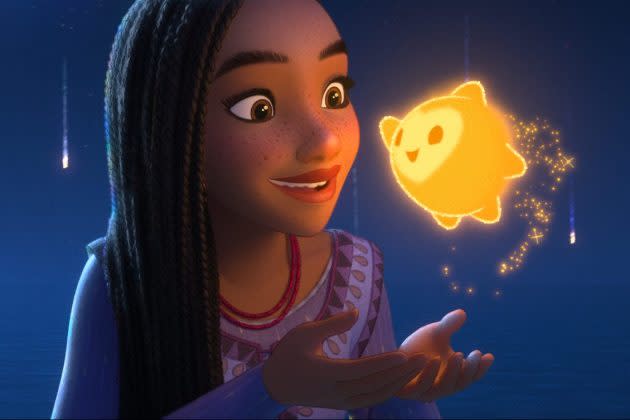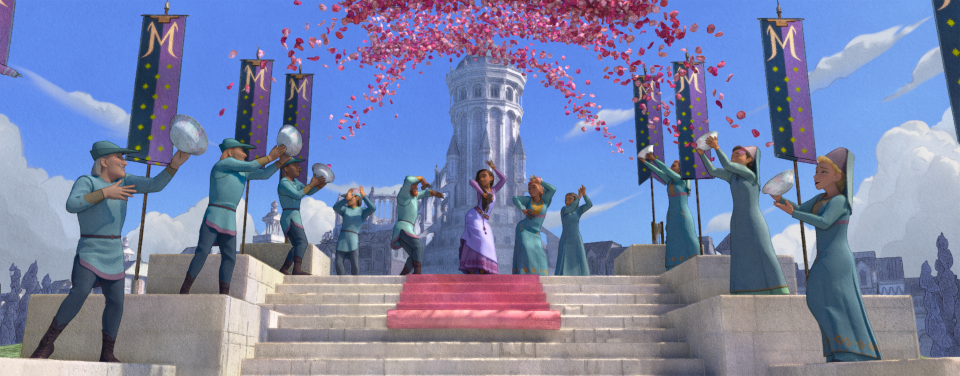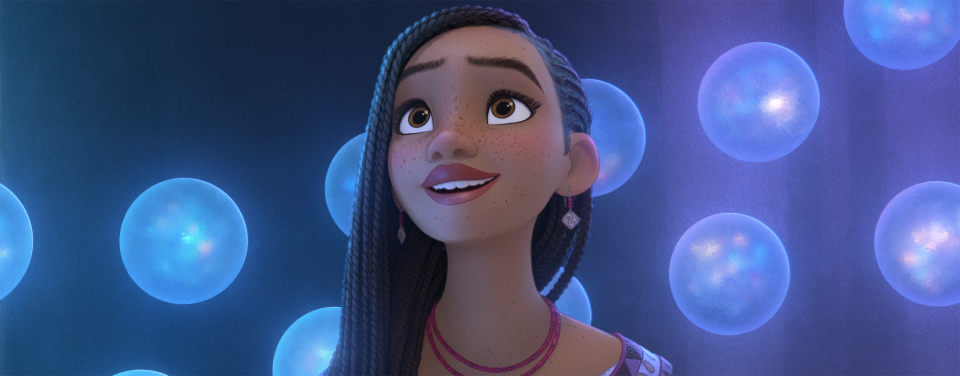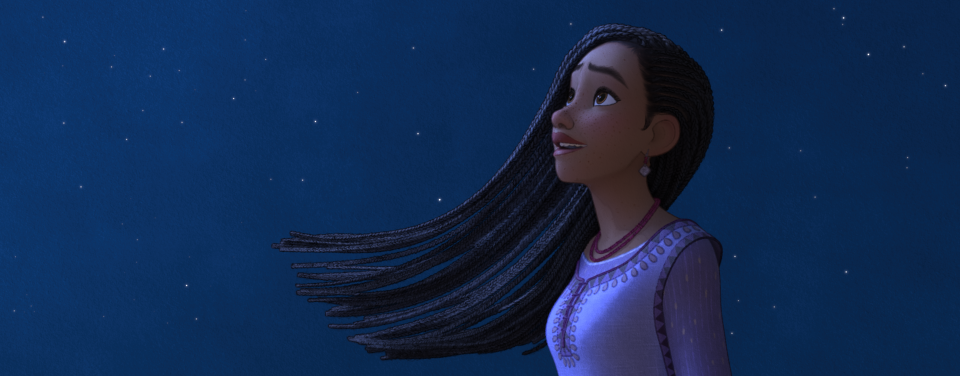Julia Michaels Wrote the Theme Song for ‘Wish’ Before the Script Even Existed
- Oops!Something went wrong.Please try again later.
- Oops!Something went wrong.Please try again later.

Disney Animation Studios’ chief creative officer Jennifer Lee had not yet written the script for “Wish” when Grammy nominated songwriter Julia Michaels wrote the demo for “This Wish” in 2020. But that demo, Lee says, “defined the whole movie; it became our North Star.”
Celebrating 100 years of storytelling at Disney, “Wish” pays homage to the celestial entity so many have wished upon. Ariana DeBose voices Asha, its main protagonist and heroine, a 17-year-old who lives in the magical kingdom of Rosas, ruled by Disney’s newest villain, King Magnifico, voiced by Chris Pine. Rosas is built on people’s wishes and hopes. When Asha makes a wish one night, she accidentally summons Star, an energetic character from the sky. An adventurous journey capturing hope, joy and the power of dreams follows.
More from Variety
Chris Buck and Fawn Veerasunthorn direct, while Lee, Allison Moore and Buck penned the screenplay; Michaels and songwriting partner Benjamin Rice created the songs of empowerment and hope that help drive the story.
“Welcome” songs such as “Belle” and “Family Madrigal,” from Disney’s “Beauty and the Beast” and “Encanto,” respectively, set the tone and offer exposition. In writing “Wel-come to Rosas,” Michaels needed to fit into that canon and write something that was “quintessentially Disney.”
“I wrote this one the fastest because I was so excited,” says Michaels. “I wanted to sonically incorporate the world in which it lives, this Iberian, Greek, North African world.”
The song needed to represent Asha’s love for the city and her people. It’s also the first look at the character: a bright, smart young woman.
DeBose describes it as “a Sondheimian patter” song.
“I was clear I needed a lot of oxygen to get through it,” DeBose notes. “There was a Hispanic undercurrent, and I was very cognizant that I wanted to sing this for ‘Wish,’ and while it feels Hispanic in nature, this is not necessarily an ode to ‘Encanto.’”
She wanted to bring her own interpretation to the song so she “created Asha’s alter-ego. We named her Janet, the tour guide. I was in the [recording] booth and Janet gave me all the energy I needed to deliver Asha’s view of Rosas,” says DeBose. The song fills in the audience about the kingdom and its ruler, and what happens to wishes that Magnifico collects. DeBose notes that Asha is also “inherently very nurturing and compassionate.”

King Magnifico has the power to make wishes come true, and the kingdom was built on this promise — the king actually collects and keeps people’s wishes in his castle. Citizens like Asha believe in his power.
The song “At All Costs,” sung by Asha and King Magnifico, was important to Lee. The song navigates the importance of the wishes to each of them, and the two are emotionally aligned here. Lee pushed for a song expressing this. “You had to understand what it felt like to hold someone’s wish in your hand. How do we viscerally understand that when you’re with them, you feel like you’re holding someone’s raison d’être?” she says. “You can’t do this in any other way but song.
Since there was no love song in the film, Michaels wanted to write a song that as a standalone sounded like a love song that could be played at weddings. Yet in the context of the film, it’s about the heroine and villain. Says Michaels, “How cool would it be if we wrote a song that if you listened to on its own, it sounds like a love song, it could be something you could play at your wedding, or be a lullaby to your kids, just something really beautiful, but when you watch the film, it’s the heroine and it’s the villain.” She continues, “You realize they’re coming about this both from various points, one from a very selfless standpoint and one from a selfish standpoint.”
“That was my favorite to record,” DeBose says, adding that she and Pine did not record the duet together. She laid her vocals down first. “It’s so heart-connected. It’s a realization of a passion and a different level of empathy,” DeBose says, adding, “She has unconditional love. It’s born and fully fledged in that moment. You get to see her heart.”

Michaels’ work on “This Wish” began in 2020 when Michaels received a call from Tom MacDougall, president of Walt Disney Music. Her brief was simple: “It was about an ordinary girl who goes on this brave, selfless journey to get wishes back for the people she loves.” The demo would be a showcase for the film and highlight Asha’s moment when she makes a wish for her town. “At the time, there was a lot of activism in my life and life in general. I thought it was something I could speak on,” Michaels says.
“Asha is very different from me in terms of being outwardly brave and facing her fears,” she observes. “I thought about the idea of Disney’s legacy and believing in yourself and that things are possible.”
Lee says she cried when she first heard it. Not only was it the foundation, but it would also help them get to the end of the film.

Similarly, DeBose found the lyrics echoing beyond the film. “We live in a time where people do need to speak up. It’s a broader commentary on the world,” she says. “When I moved to New York City, I talked about feeling like people pigeonholed me. A lot of the response was ‘You’re young, you don’t know anything, but this is what’s right for you.’ But it’s absolutely not, because why do you get to decide? Why can’t I discover that on my own? That’s why I love Asha so much. I feel very connected to her.
“I want the right to explore my possibilities,” DeBose says. “You don’t get to take that away from me.”
“This Wish” comes at a crucial moment, Veerasunthorn says. “You feel Asha’s frustrations that have been building since ‘At All Costs,’” says the co-director. “All the songs connect: ‘Welcome to Rosas’ is about getting to know the people and why she loves them; ‘At All Costs’ follows the notion of people having big dreams; and with ‘This Wish,’ she wants everyone to have this possibility and potential of those wishes coming true.”

“Knowing What I Know Now” needed a solid drum beat. “We knew it was going to be a revolutionary song,” says Michaels, “and what better way to do that than with drums?” During this, all of Asha’s friends think she has betrayed the kingdom. But they’re wrong, and she’s trying to rally them against Magnifico.
It’s a turning point for Asha, as the concept of speaking a wish out loud is taken to the next level. Points out DeBose: “This is the moment you see her become a full-fledged activist. She’s flying on pure instinct, and she knows it’s the right thing to do.”
Adds Lee: “It’s the moment she becomes a leader.”
For the “This Wish” reprise when the town finally comes together, Veerasunthorn explains, it’s a moment for the town to “take back their agency.” DeBose recalls “lobbying for her to get to visibly get the crap kicked out of her.” She adds, “If we’re going to take her to this emotional place, she may not live. She’s gone this far. And the martyrdom is absolutely terrifying, in theory, and when it becomes your reality, you’re dying for what you believe. And it’s a last-ditch effort.”
When it came to writing the song, the line “The way you always taught us to,” resonated with her and Rice. Says Michaels, “I remember reading it and thinking what if they look up at Magnifico, and it’s their moment of being like ‘You showed us how to wish for things and how to dream.’ I thought, ‘How cool would it be if that’s the moment?'”
Adds Lee, “This is the moment of the power of the community. This goes back to ‘I’m a Star’ when they’re all connected.”
Best of Variety
Sign up for Variety’s Newsletter. For the latest news, follow us on Facebook, Twitter, and Instagram.

